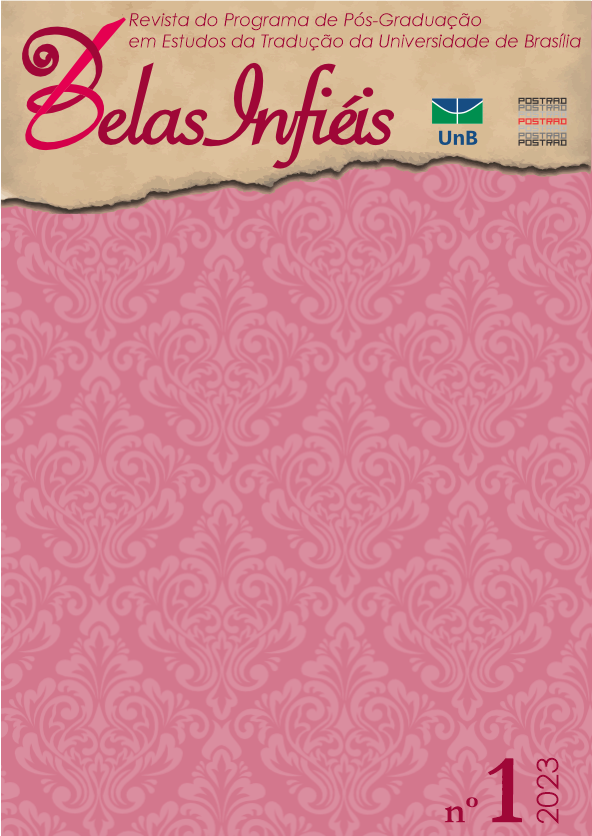Lexico-Semantic Analysis in Specialized Translation
DOI:
https://doi.org/10.26512/belasinfieis.v12.n1.2023.39172Keywords:
Technical and scientific translation. Translation competence. Thematic capacity. Lexical semantics. Terminology.Abstract
This paper presents a case study research referred to activities in a course on Technical and Scientific Translation Practice (English-Portuguese) at the Translation Program in the University of Brasilia. The purpose is to develop an approach to help translation students to understand linguistic functioning of terms in specialized translations. This study is based on the translation competence framework (Gonçalves, 2015), particularly on the thematic capacity/terminological knowledge which are necessary to develop a technical or scientific translation. It is also based on the lexical semantic approach for Terminology (L’Homme 2004, 2016, 2017, 2020) which helps to understand and explain the functioning of terms. The methodology is conducted by i) selecting terms extracted from source texts, particularly scientific articles in English, that present lexical difficulties related to the terminological structure in the target text in Brazilian Portuguese; ii) building a comparable corpus containing texts that pertain to the same language, topic, and genre of the target text. The results show that lexical difficulties are due to predicative terms and lexical relations that require a specific terminological structure to the appropriate understanding of lexical meaning and establishment of the expected lexical relations in a specialized text. Within the scope of translation teaching, we intend in future work to develop research to prepare lexical activities, such as in Alipour (2018), that raise learners’ awareness for understanding the linguistic property of terms, and to verify to what extent these activities may mobilize thematic capacity/terminological knowledge of translation students.
Downloads
References
Alipour, M. (2018). Approche socioconstructiviste pour l’enseignement-apprentissage du lexique spécialisé: apport du corpus dans la conception d'activités lexicales [Tese de doutorado, Université de Montréal]. http://olst.ling.umontreal.ca/
AntConc. (2014). AntConc (3.4.4w) [Software de computador]. AntConc. http://www.laurenceanthony.net/software/antconc/
Avissar, R., & Werth, D. (2005). Global Hydroclimatological Teleconnections Resulting from Tropical Deforestation. Journal of Hydrometeorology, 6(2), 134-145. https://doi.org/10.1175/JHM406.1
Dictionnaire fundamental de l’environnement - DiCoEnviro. (s.d.). http://olst.ling.umontreal.ca/cgi-bin/dicoenviro/search.cgi
Fillmore, C. (1982). Frame Semantics. In Linguistics in the Morning Calm (pp.111-137). Hanshin Publishing Company.
Fillmore, C., & Baker, C. (2010). A frames approach to semantic analysis. In B. Heine, & H. Narrog (Eds.). The Oxford Handbook of Linguistic Analysis (pp.313-339). Oxford University Press.
Fillmore, C., Petruck, M.R.L., Roppenhofer, J., & Wright, A. (2003). FrameNet in Action: The Case of Attaching. International Journal of Lexicography, 16(2), 297-332. https://academic.oup.com/ijl
A Framed Version of DiCoEnviro. (s.d.). http://olst.ling.umontreal.ca/dicoenviro/framed/index.php.
FrameNet. (s.d). https://framenet.icsi.berkeley.edu/fndrupal/
FrameNet Brasil. (s.d.). https://www.ufjf.br/framenetbr-eng/
Gonçalves, J. L. V. R. (2015). Repensando o desenvolvimento da competência tradutória e suas implicações para a formação do tradutor. Revista Graphos, 17(1), 114-130. https://periodicos.ufpb.br/index.php/graphos
Lamberti, F. (2017). Extração de conhecimento: métodos de identificação de relações terminológicas aplicados ao português do Brasil. Tradterm, 29, 168-185. https://www.revistas.usp.br/tradterm
L’Homme, M. C. (2004). La terminologie: principes et techniques. Presses de l’Université de Montréal.
L’Homme, M. C. (2005). Sur la notion de ‘terme’. Meta, 50(4), 1112-1132.
L’Homme, M. C. (2016, 4 de julho). Terminologie de l’environnement et sémantique des cadres. [Apresentação de conferência]. SHS Web of Conferences, 5º. Congrès Mondial de Linguistique Française, França. https://doi.org/10.1051/shsconf/20162705010
L’Homme, M. C. (2017). Maintaining the balance between knowledge and the lexicon in terminology: a methodology based on Frame Semantics. Lexicography, Journal of Asialex, 4(1). https://journal.equinoxpub.com/lexi/issue/view/1787
L’Homme, M. C. (2020). Lexical Semantics for Terminology: an introduction. Amsterdam/Philadelphia. John Benjamins Publishing Company.
L’Homme, M. C., & Pimentel. J. (s.d.). Guide d’annotation des contextes anglais du DiCoInfo. Université de Montréal. http://olst.ling.umontreal.ca/
L’Homme, M. C., & Robichaud, B. (2014, agosto). Frames and terminology: representing predicative units in the field of the environment. Cognitive Aspects of the Lexicon (Cogalex 2014). Dublin, Irlanda. https://aclanthology.org/W14-4723/
L’Homme, M. C., Robichaud, B., & Subirats, C. (2020, 23 de junho). Building multilingual specialized resources based on FrameNet: Application to the field of the environment. [Apresentação de comunicação]. International FrameNet Workshop 2020. Towards a Global, Multilingual FrameNet. Marseille, França. https://www.globalframenet.org/ifnw2020
Mel’cuk, I., Clas, A., & Polguère, A. (1995). Introduction à la lexicologie explicative et combinatoire. Louvain-la-Neuve.
Perroti-Garcia, A. J. (2008). Uso de corpora customizados para aperfeiçoar o texto traduzido. Estudos linguísticos, 37(2), 123-128.
Polguère, A. (2018). Lexicologia e semântica lexical: noções fundamentais. Tradução de Sabrina Pereira de Abreu. Contexto.
Seth, W. & Kimberly, A. N. (2017). The climate mitigation gap: education and government recommendations miss the most effective individual actions. Environmental Research Letters, 12. https://iopscience.iop.org/article/10.1088/1748-9326/aa7541
Welch, J. R., Brondízio, E. S., Hetrick, S. S., & Coimbra Jr, C. E. A. (2013). Indigenous Burning as Conservation Practice: Neotropical Savanna Recovery amid Agribusiness Deforestation in Central Brazil. PLOS one, 8(12). https://doi.org/10.1371/journal.pone.0081226
Downloads
Published
How to Cite
Issue
Section
License
Copyright (c) 2023 CC BY

This work is licensed under a Creative Commons Attribution 4.0 International License.
Given the public access to this journal, the texts are free to use but requires the recognition of the original authorship and initial publication in this journal to be properly stated.
 The journal allows the use of works published for non-commercial purposes, including the right to submit the work to publicly accessible databases. Published contributions are the sole and exclusive responsibility of the author(s).Â



















